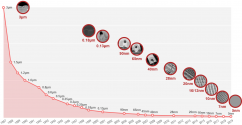You still believe that? Russia has been getting hit by US sanctions on the MC-21 airplane project for quite some time. Initially the US had that defined percentage at a certain level, then they kept decreasing it until right now on certain components the percentage of US origin content sanctioned, the threshold, is zero. Which means you can't even have a US origin screw or bolt in it. Then there's the chilling effect something like this produces. Other partners on the MC-21 project in Europe are telling the Russians unoficially they won't supply them due to fear of being sanctioned themselves.
Plus, like others said, the US can simply keep ratcheting up the sanctions as they want. They threatened to sanction AllSeas for building Nord Stream 2, by cutting their monetary transactions on the dollar, they sanctioned the Venezuelan oil company by seizing their US assets, even assets outside the US were seized. Plus like others said, Iran is supposed to not even be able to sell its own oil. Just look at what they did to Iraq when Saddam was in power as an example. At one point Iraq couldn't sell their own oil, not purchase food, or medicine.


